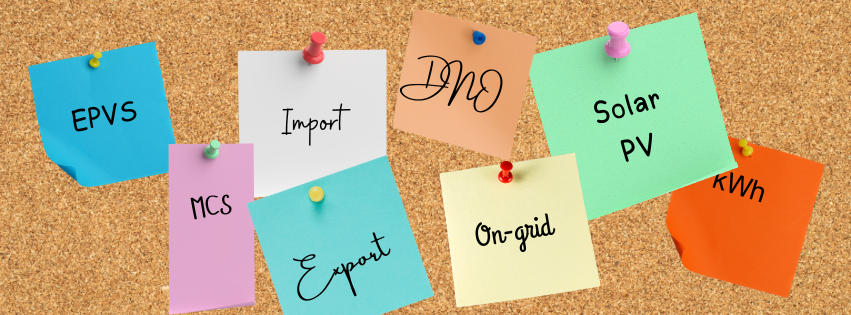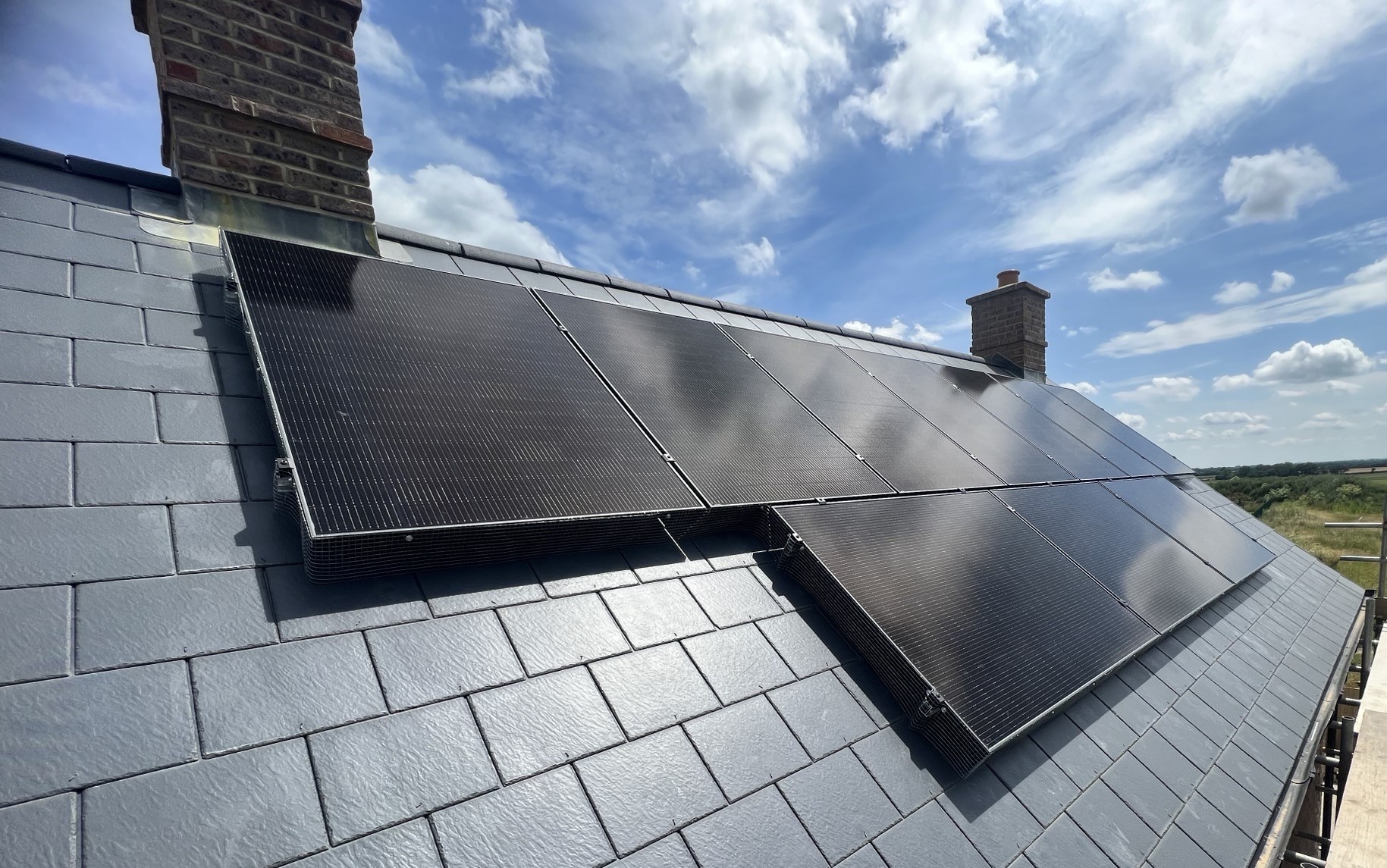At SolarTherm UK, we know the world of solar can feel overwhelming—especially when you’re hit with unfamiliar terms like inverter efficiency, kWh, or MCS certification.
That’s why we’ve created this simple Solar Dictionary to help you decode the jargon and feel confident in your solar journey. Whether you’re just getting started or already considering an installation, these are the terms worth knowing.
AC (Alternating current) – the type of electricity used across the UK. Solar panels create DC (direct current) electricity so a solar inverter is required to convert DC into usable AC electricity.
Array – a solar array is the design of your solar panels and how they are arranged on your roof or ground mounts.
Battery Storage – a system that stores excess solar electricity for use later – usually at night or when solar generation is lower.
CO₂ (Carbon Dioxide) – carbon dioxide is a greenhouse gas contributed to global warming. Human activities – like the combustion of fossil fuels for energy – have caused CO₂ levels to rise to dangerous levels.
DC (Direct current) – the type of electricity produced by solar panels and stored in batteries. DC electricity is not usable in UK homes and businesses so requires a solar inverter to convert the DC electricity into usable AC electricity.
DNO (Distribution Network Operator) – this is the company responsible for the electricity grid in your area and permission is required from them when you have solar installed to ensure it is safe to do so without overloading the grid.
EPC (Energy Performance Certificate) – this is the energy efficiency of a building, both residential and commercial. Rated from A to G, with A being the most efficient and G showing little to no efficiency, the higher your efficiency, the better it is for your property value, pocket and carbon footprint.
EPS (Emergency Power Supply) – keeps your lights or a plug socket live in the event of a power cut from the grid using stored energy in your battery. You must have an EPS ready inverter and separate consumer unit installed.
EPVS (Energy Performance Validation Scheme) – a third-party assessor that ensures consumers are protected when purchasing renewable energy products. EPVS ensures installers are providing accurate and transparent estimates on savings, performance and payback times.
Feed-in Tariff (FiT) – now closed to new applications, this was the original government scheme to pay consumers for export of green electricity back to the grid. Was replaced in 2020 with the Smart Export Guarantee (SEG).
Grid-tied System (on-grid system) – a solar PV system connected to the National Grid. The simplest of systems to install which allows you to export excess electricity back to the grid and import electricity when needed.
HIES (Home Insulation & Energy Systems Quality Assured Contractors Scheme) – a consumer protection organisation for purchasing energy related home improvements. Providing deposit protection, insurance-backed guarantees and access to dispute resolution services.
Immersion Diverter – a device used to direct excess solar electricity to power an immersion heater and hot water tank. Common brands are iBoost or InnerSun.
Import – electricity drawn from the grid when needed, usually if you have higher usage than generation or at night when your solar panels are not producing electricity.
Inverter – the brains of your solar PV system. They convert DC electricity into usable AC electricity. Can come in one of three main forms – string inverter, microinverters and hybrid inverters.
kW and KWh (Kilowatt and Kilowatt-hour) – a kW is a measure of power for your systems capacity, a kWh is a measure of energy and how much electricity you generate or use.
MCS Certification – the Microgeneration Certification Scheme is the official UK standard for solar installations. Using a MCS-certified installer and MCS-approved equipment is essential to access SEG payments and to ensure your investment is of high quality and UK safety standards.
Monocrystalline Solar Cells – monocrystalline solar cells are made from a single piece of silicon and tend to operate at higher efficiencies.
Mounting System – what’s used for your solar array – either rooftop rails and clamps or ground-standing mounting units.
MPPT – Maximum Power Point Tracking. A solar panel produces electricity depending on sunlight intensity, temperature and load. The specific voltage and current combination where the panel produces maximum power is called the Maximum Power Point. Solar panels are connected to an inverter which constantly monitors voltage and current from the panels, adjusting the electrical load to keep the system operating at the maximum power point.
Off-grid System – a solar PV system that isn’t connected to the National Grid. The system relies on sufficient battery storage and a backup generator. Ideal for remote properties or those looking to go off-grid.
Perovskite Solar Cells – these are type of solar cells made using a high-efficiency compound call perovskite. Currently not available for residential use in the UK, they are beginning to be used on large commercial setups.
Photovoltaic (PV) – the full term for solar panels. Photo = light and voltaic = electricity.
Polycrystalline Solar Cells – also known as multicrystalline cells, these are made from silicon crystals that are melted together to form a solar panel. These earlier solar panels, while still available to purchase are not as efficient as modern monocrystalline solar cells.
Smart Export Guarantee (SEG) – replaced the FiT in 2020, a scheme where energy suppliers pay for excess electricity exported back to the grid. Only available if your system is MCS certified.
String Inverter – a single inverter connected to multiple solar panels in a string – the simplest kind of solar inverter and most cost effective for a shade free single orientation roof.
Solar Thermal Panels – installed to capture the sun’s light and heat to generate heat, used mainly for heating water on commercial and residential buildings. Not used as frequently now on residential buildings due the advances of technology in solar PV panels being used for heating and hot water.
Thermodynamic panels – hot water panels using thermodynamics and and heat exchange principles to provide hot water day or night.
Zappi (or other smart EV chargers) – a type of EV charger that integrates with your solar PV system allowing you to charge your car using solar power. The smart system lets you choose when your EV is charged.
Understanding the language of solar puts you back in control. Whether you’re speaking to a solar consultant, comparing quotes or just researching, this solar dictionary can help you navigate with confidence.
If you’re ever unsure, SolarTherm UK is always happy to explain things in plain English – no jargon, no confusion.
Ready to go solar?
Contact SolarTherm UK today for your free bespoke design package. No jargon, no hard-sell, just honest, expert advice.





